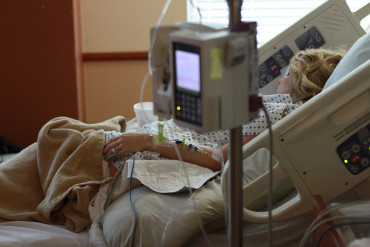How To Know If You Suffered From Postpartum Hemorrhage

During childbirth, the focus can often be solely on the baby.
But the health of new mothers should also be the priority. In 2021, over 1,200 women died in the United States as a result of pregnancy or delivery complications (up by 38.2 percent from 2020), according to the Centers for Disease Control and Prevention.
Postpartum hemorrhage is the leading cause of these complications, with 11 percent of new moms in the U.S. bleeding too much. While that may not seem like a lot on a percentage basis, it equates to 474,000 affected women.
What Is Postpartum Hemorrhage?
Postpartum hemorrhage is when a new mother starts bleeding profusely and to a dangerous level after giving birth. Postpartum hemorrhages most often occur after cesarean births. Most postpartum hemorrhages happen immediately after birth, but sometimes they can occur slightly later.
What Causes Postpartum Hemorrhage?
During labor, a pregnant woman experiences contractions to help deliver her baby. After the baby arrives, her uterus continues to contract to push out the placenta.
After the placenta is delivered, the contractions continue to aid in compressing the bleeding vessels where the placenta was attached. If the uterus does not contract strongly enough, the blood vessels would bleed freely, and a hemorrhage would occur.
Some new mothers face a higher risk of postpartum hemorrhage. These conditions increase a mother’s risk:
- Placental abruption: This is the early detachment of the placenta from the uterus
- Placenta previa: This is when the placenta covers or is near the cervical opening, which means the placenta would be delivered before the baby, posing danger for the infant
- Overdistended uterus: This is when the uterus is enlarged due to too much amniotic fluid or a large baby, especially a baby weighing more than 8.8 pounds
- Multiple pregnancies: If a woman has more than one placenta and it caused the overdistention of the uterus
- If the mother experiences gestational hypertension, preeclampsia, or high blood pressure during pregnancy
- Prolonged labor
- Infection
- Obesity
- If the mother took medications to induce labor
- If the mother needed medications to stop contractions, preventing preterm labor
- The use of forceps or vacuum-assisted delivery can cause a hemorrhage
- General anesthesia
New moms are also at risk for postpartum hemorrhages if:
- There is a tear in the cervix or vaginal tissues
- A tear in a uterine blood vessel
- If the mother suffers from blood clotting disorders, such as disseminated intravascular coagulation
- The placenta is abnormally attached to the inside of the uterus, known as placenta accreta
- Placenta increta, when the placental tissues invade the muscle of the uterus
- Placenta percreta, which is when the placental tissues go all the way into the uterine muscle and may break through (rupture)
- Complications during a cesarean section due to a doctor’s mistake or negligence
What Are The Risks Of Postpartum Hemorrhages?
It’s rare, but postpartum hemorrhage can be life-threatening to the new mother.
If a new mom experiences excessive and rapid blood loss, it can cause a severe drop in the mother's blood pressure. This may lead to shock or death if not treated properly.
How do you know if you have postpartum hemorrhage?
If you experience any of these symptoms, immediately alert your doctor or call 9-1-1.
- Excessive, heavy bleeding from the vagina that is not slowing down
- If your blood pressure drops
- If you have blurry vision, chills, clammy skin, or a really fast heartbeat
- If you’re feeling confused or dizzy, sleepy or weak, or feeling like you’re going to faint
- If you experience nausea
- If you throw up
- If your skin goes pale
- If the new mom experiences swelling and pain around the vagina or perineum. The perineum is the area between the vagina and the rectum
What Should You Do If Your Wife Died From Postpartum Hemorrhage In Pennsylvania?
If you think your wife had a postpartum hemorrhage that was caused by a doctor’s error or medical malpractice, you may be entitled to compensation through a medical malpractice lawsuit. While there is nothing we can do to bring your wife back, we can help you recover financially. Childbirth can be expensive, and if you’ve lost your spouse, you probably have funeral expenses to deal with, along with medical bills. Let our experienced medical malpractice attorneys in Philadelphia help you help your family.
At Ross Feller Casey, we have a national reputation for helping families during this difficult time. We have an unmatched record of winning all types of medical malpractice cases, including multimillion-dollar recoveries in lawsuits involving postpartum hemorrhage deaths.
With our team of Ivy league-trained doctors and doctor-lawyers right on staff, we’re able to advise you and your family throughout the legal process. Ross Feller Casey handles all of its cases on a contingency basis. That means that you will not pay a thing until a recovery is made in your case. Call today for a free consultation.
Disclaimer: Ross Feller Casey, LLP provides legal advice only after an attorney-client relationship is formed. Our website is an introduction to the firm and does not create a relationship between our attorneys and clients. An attorney-client relationship is formed only after a written agreement is signed by the client and the firm. Because every case is unique, the description of awards and summary of cases successfully handled are not intended to imply or guarantee that same success in other cases. Ross Feller Casey, LLP represents catastrophically injured persons and their families in injury and wrongful death cases, providing legal representation in Pennsylvania and New Jersey.





